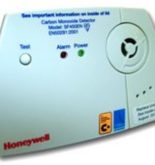Belfast City Council is the landowner of a former landfill site now used as a large industrial estate of over 200 buildings. The Council obtains significant revenue from leasing the land but also has the responsibility for managing a serious problem associated with the site.
Although closed for over thirty years, the levels of methane and carbon dioxide (CO2), an asphyxiant, produced from landfill waste degradation still needs to be controlled and monitored for potential gas ingress to
buildings. Not surprisingly, a large proportion of the work of scientific officer, Martin Black, involves routine gas monitoring. He uses a portable gas analyser from Gem Scientific to check indoor air quality (IAQ) of CO2 to help identify any potential health risks.
On top of this, if there are complaints about flue gas, smoke or fumes from homeowners or tenants in any area of the City, Martin Black may leave his CO2 analyser in domestic and commercial properties. When
complainants state they feel ill on returning to work on Monday morning, he sets up to check changes in the microenvironment over the weekend. He said he finds leaving the monitor for a weekend to record O2 levels in office or warehouse environments, to which he may
not have weekend access, is an excellent solution.
He points out the daylong, eight-hour battery life with mains adapter and data storage allow him to monitor and collect data for a few days at a time. Because the analyser with its pump is quiet and small it does not disturb anyone when left in the premises being monitored. Martin Black said, “For us, this IAQ CO2 analyser is an excellent piece of equipment and is adaptable to monitor in different situations. The software is easy to use and allows a printout and graphs to show all that was recorded.â€
Checking on the concentration of CO2 indicates the likely levels of other landfill gases. These include large quantities of methane and carbon dioxide and numerous other gases at lower concentrations. Methane mixed with air can be highly explosive. Even very low levels of carbon dioxide, as an asphyxiant, can cause headaches, drowsiness and loss of ability to maintain concentration. Martin Black checks to be certain CO2 concentrations are no higher than 1.5 percent (15,000ppm – the normal Short Term Exposure Limit set by HSE and OSHA.
“This is why I use the CO2 analyser to monitor and measure any occurrences,†he said.
The Council also enforces The Health and Safety at Work Order 1978, under which employers must “ensure so far as is reasonably practicable the health, safety and welfare at work of all their employees”, including making sure that employees are not exposed to danger from gas ingress. Martin makes sure that employers comply with these responsibilities and in carrying out his monitoring role he follows the guidance in EH40, “Workplace Exposure Limits”.
Martin Black confirmed that he started using the Geotech (UK) portable Anagas CD 98 gas analyser in 2006.
Since then potential problems of gas migration from an old landfill site are fully controlled.
Although closed for over thirty years, the levels of methane and carbon dioxide (CO2), an asphyxiant, produced from landfill waste degradation still needs to be controlled and monitored for potential gas ingress to
buildings. Not surprisingly, a large proportion of the work of scientific officer, Martin Black, involves routine gas monitoring. He uses a portable gas analyser from Gem Scientific to check indoor air quality (IAQ) of CO2 to help identify any potential health risks.
On top of this, if there are complaints about flue gas, smoke or fumes from homeowners or tenants in any area of the City, Martin Black may leave his CO2 analyser in domestic and commercial properties. When
complainants state they feel ill on returning to work on Monday morning, he sets up to check changes in the microenvironment over the weekend. He said he finds leaving the monitor for a weekend to record O2 levels in office or warehouse environments, to which he may
not have weekend access, is an excellent solution.
He points out the daylong, eight-hour battery life with mains adapter and data storage allow him to monitor and collect data for a few days at a time. Because the analyser with its pump is quiet and small it does not disturb anyone when left in the premises being monitored. Martin Black said, “For us, this IAQ CO2 analyser is an excellent piece of equipment and is adaptable to monitor in different situations. The software is easy to use and allows a printout and graphs to show all that was recorded.â€
Checking on the concentration of CO2 indicates the likely levels of other landfill gases. These include large quantities of methane and carbon dioxide and numerous other gases at lower concentrations. Methane mixed with air can be highly explosive. Even very low levels of carbon dioxide, as an asphyxiant, can cause headaches, drowsiness and loss of ability to maintain concentration. Martin Black checks to be certain CO2 concentrations are no higher than 1.5 percent (15,000ppm – the normal Short Term Exposure Limit set by HSE and OSHA.
“This is why I use the CO2 analyser to monitor and measure any occurrences,†he said.
The Council also enforces The Health and Safety at Work Order 1978, under which employers must “ensure so far as is reasonably practicable the health, safety and welfare at work of all their employees”, including making sure that employees are not exposed to danger from gas ingress. Martin makes sure that employers comply with these responsibilities and in carrying out his monitoring role he follows the guidance in EH40, “Workplace Exposure Limits”.
Martin Black confirmed that he started using the Geotech (UK) portable Anagas CD 98 gas analyser in 2006.
Since then potential problems of gas migration from an old landfill site are fully controlled.



